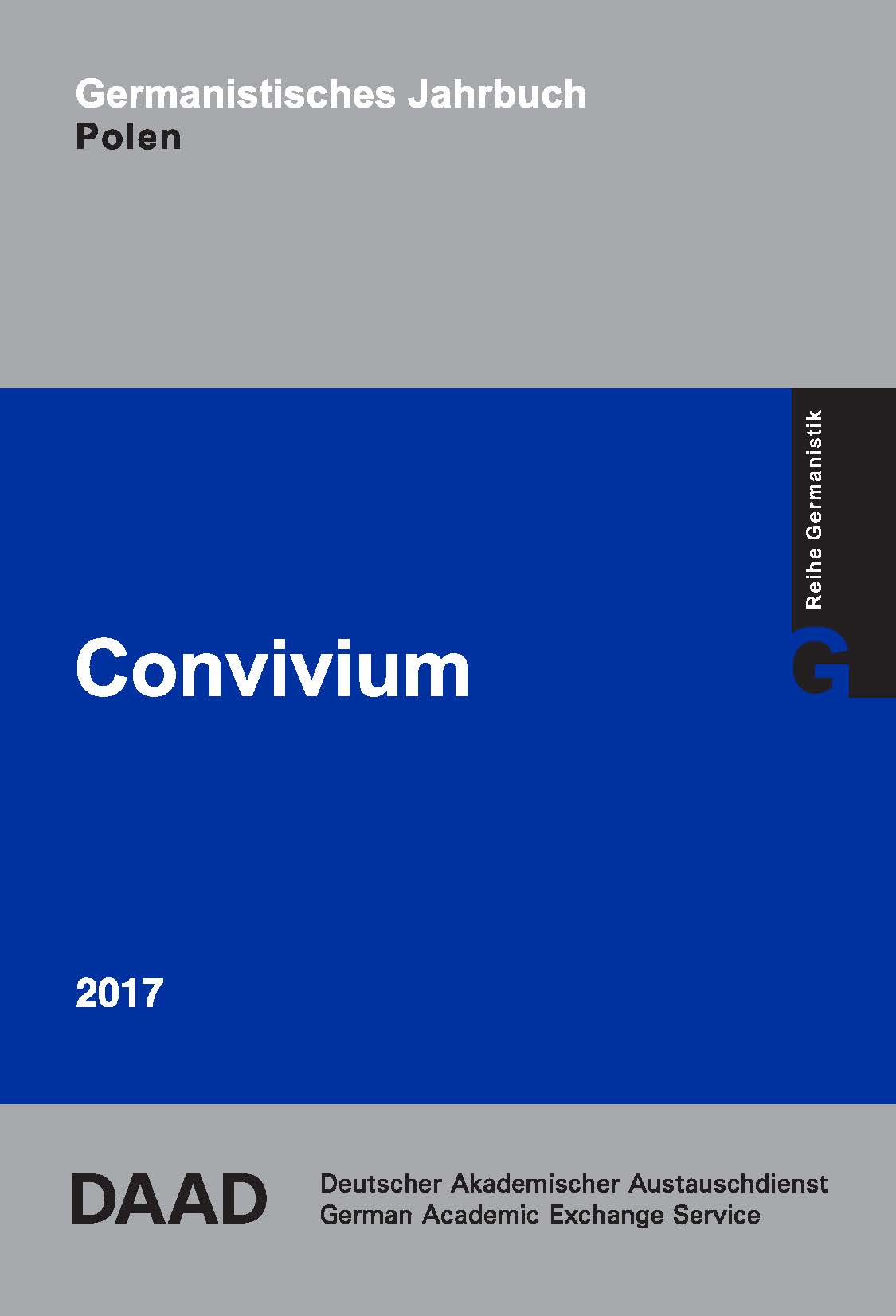Komplementy w wiadomościach rozpoczynających kontakt na przykładzie portalu randkowego sympatia.onet.pl. Analiza lingwistyczna
DOI:
https://doi.org/10.18778/2196-8403.2017.06Abstrakt
Wraz ze zwiększającą się liczbą osób poszukujących swojego życiowego partnera w internecie, rośnie również zainteresowanie językoznawców zachowaniami użytkowników portali randkowych. Niniejszy artykuł stanowi próbę analizy sposobu nawiązywania kontaktów międzyludzkich w tym kontekście ze szczególnym uwzględnieniem komplementów w tekstach inicjujących kontakty na znanym w Polsce portalu sympatia.onet.pl. Spośród 100 wiadomości przesłanych przez Polaków do użytkowniczki tegoż portalu analizie poddano te, w których pojawiły się komplementy, dzięki czemu możliwa była ich charakterystyka, m.in. pod kątem tzw. focus w odniesieniu do HERBERTA (1990). Poza tym omówiona została struktura morfologiczno-składniowa komplementów, środki leksykalne oraz komplementowane obiekty.
Bibliografia
BONACCHI, SILVIA (2013): (Un)Höflichkeit. Eine kulturologische Analyse Deutsch –Italienisch – Polnisch. Frankfurt a. M.
Google Scholar
DOI: https://doi.org/10.3726/978-3-653-03591-9
CHEN, RONG (1993): Responding to compliments: A contrastive study of politeness strategies between American English and Chinese speakers. In: Journal of Pragmatics 20:49-75.
Google Scholar
DOI: https://doi.org/10.1016/0378-2166(93)90106-Y
DAIKUHARA, MIDORI (1986): A study of compliments from a cross-cultural perspective. Japanese vs. American English. In: Penn Working Papers in Educational Linguistics 2(2):103-133.
Google Scholar
DRABIK, BEATA (2004): Komplement i komplementowanie jako akt mowy i komunikacyjna strategia. Kraków.
Google Scholar
DUTTLINGER, CLAUDIA (1999): Komplimente im Spanischen. Freiburg.
Google Scholar
ECKERT, PENELOPE / MCCONNELL-GINET, SALLY (2003): Language and Gender. New York.
Google Scholar
DOI: https://doi.org/10.1017/CBO9780511791147
FRANKOWSKA, VIOLETTA (2017): Komplimenterwiderungen und Geschlecht im deutsch-polnischen Vergleich. Eine linguistische Studie. Poznań.
Google Scholar
GROCHOWALSKA, KATARZYNA (2012): Cyberflirt: czym zachowania online różnią się od tych offline. In: Humanicus 7: www.humanicus.org/global/issues/humanicus-7-2012/humanicus-7-2012-5.pdf (30.05.2018).
Google Scholar
HERBERT, ROBERT K. (1990): Sex-based differences in compliment behavior. In: Language in Society 19:201-224.
Google Scholar
DOI: https://doi.org/10.1017/S0047404500014378
HOLMES, JANET (1986): Compliments and compliment responses in New Zealand English. In: Anthropological Linguistics 28(4):485-508.
Google Scholar
HOLMES, JANET (1988): Paying compliments. A sex-preferential politeness strategy. In: Journal of Pragmatics 12:445-465.
Google Scholar
DOI: https://doi.org/10.1016/0378-2166(88)90005-7
JAWORSKI, ADAM (1995): ‘This is not an Empty Compliment!’ Polish Compliments and the Expression of Solidarity. In: International Journal of Applied Linguistics 5:63-94.
Google Scholar
DOI: https://doi.org/10.1111/j.1473-4192.1995.tb00073.x
KACPRZAK, KAMILA (2014): Zmiany w sposobie poszukiwania partnera życiowego –przegląd badań dotyczących użytkowników portali randkowych. In: Teraźniejszość–Człowiek – Edukacja. Bd. 17, 4(68):147-162.
Google Scholar
LORENZO-DUS, NURIA (2001): Compliment responses among British and Spanish university students. A contrastive study. In: Journal of Pragmatics 33:107-127.
Google Scholar
DOI: https://doi.org/10.1016/S0378-2166(99)00127-7
MANES, JOAN / WOLFSON, NESSA (1981): The compliment formula. In: COULMAS, FLORIAN (ed.): Conversational Routine. Explorations in Standardized Communication Situations and Prepatterned Speech. The Hague, Paris, New York, 115-132.
Google Scholar
DOI: https://doi.org/10.1515/9783110809145.115
MARX, KONSTANZE (2012): „Ich finde Dein Profil interessant“ – Warum virtuelle Erstkontakte auch für die Linguistik interessant sind. In: BEDIJS, KRISTINA / HEYDER, KAROLINE HENRIETTE (eds): Sprache und Personen im Web 2.0. Linguistische Perspektiven auf YouTube, SchülerVZ & Co. Berlin, 95-109.
Google Scholar
NELSON, GAYLE / EL-BAKARY, WAGUIDA / AL-BATAL, MAHMOUD (1996): Egyptian and American compliments. Focus on second language learners. In: GASS, SUSAN / NEU, JOYCE (eds.): Speech acts across cultures. Challenges to communication in a second language. Berlin, New York, 109-128.
Google Scholar
DOI: https://doi.org/10.1515/9783110219289.2.109
NICOLAYSEN, SÜNJE (2007): Kompliment als Höflichkeitsstrategie. Ein Vergleich am Beispiel des Schwedischen und des amerikanischen Englischen. Saarbrücken.
Google Scholar
RUHI, ŞÜKRIYE / DOĞAN, GÜRKAN (2001): Relevance theory and compliments as phatic communication. The case of Turkish. In: BAYRAKTAROĞLU, ARIN / SIFIANOU, MARIA (eds.): Linguistic Politeness across Boundaries. The Case of Greek and Turkish. Amsterdam, 341-390.
Google Scholar
DOI: https://doi.org/10.1075/pbns.88.13ruh
SIFIANOU, MARIA (2001): “Oh! How appropriate!” Compliments and politeness. In: BAYRAKTAROĞLU, ARIN / SIFIANOU, MARIA (eds.): Linguistic Politeness across Boundaries. The Case of Greek and Turkish. Amsterdam, 391-430.
Google Scholar
DOI: https://doi.org/10.1075/pbns.88.14sif
WOLFSON, NESSA (1983): An empirically based analysis of complimenting in American English. In: WOLFSON, NESSA / JUDD, ELLIOT (eds.): Sociolinguistics and language acquisition. Rowley, 82-95.
Google Scholar
http://www.komputerswiat.pl/testy/internet/portale-spolecznosciowe/2011/11/porowanie-polskich-serwisow-randkowych.aspx (30.05.2018).
Google Scholar
https://porady.sympatia.onet.pl/poznali-sie-w-sympatii/historie-milosne (30.05.2018).
Google Scholar
https://porady.sympatia.onet.pl/sympatia-radzi/portal-randkowy-sposobem-na-samotnosc/9t81dkr (31.05.2018).
Google Scholar
Pobrania
Opublikowane
Jak cytować
Numer
Dział
Licencja

Utwór dostępny jest na licencji Creative Commons Uznanie autorstwa – Użycie niekomercyjne – Bez utworów zależnych 4.0 Międzynarodowe.










